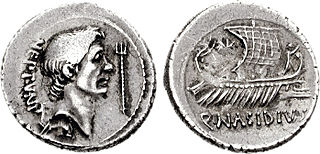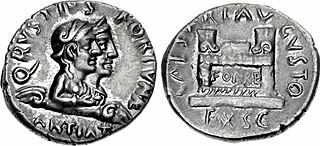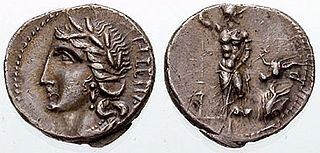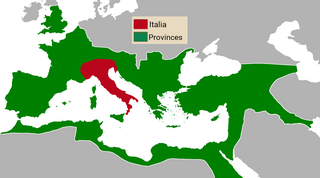
The gens Accoleia, also spelled Acoleia, Acculeia, and Aculeia, was a minor plebeian family at Rome during the latter part of the Republic. Most of what is known of this gens comes from various coins and inscriptions.
The gens Visellia was a family at Rome during the late Republic and early Empire. Two members of this gens achieved the consulship during the first century.
The gens Ninnia was a plebeian family at Rome. Members of this gens are first mentioned at Capua during the Second Punic War, and are found at Rome towards the end of the Republic. Several Ninnii held the consulship under the Flavian and Antonine emperors.
The gens Mussidia was a minor plebeian family at Rome. Few of the Mussidii attained the higher offices of the Roman state, although Titus Mussidius Pollianus obtained the consulship in the time of Caligula. Other members of this gens are known from inscriptions.
The gens Nasennia was an obscure plebeian family at Rome. None of the Nasennii held any of the higher offices of the Roman state, and the family is best known from Gaius Nasennius, a soldier in the time of Caesar. Many other Nasennii are known from inscriptions.

The gens Nasidia was an obscure plebeian family at Rome. The gens is best known from Quintus Nasidius, one of the admirals of Gnaeus Pompeius Magnus during the Civil War. Although none of the Nasidii are known to have held any of the higher offices of the Roman state, a number are known from inscriptions. A coin of this gens depicts the head of Pompeius and a trident on the obverse, and on the reverse a ship, with the inscription Q. Nasidius.
The gens Ollia was a minor plebeian family at Rome. Few members of this gens achieved any prominence, and the best-known may have been Titus Ollius, the father of the empress Poppaea Sabina. Other Ollii are known from inscriptions.
The gens Orbia was a minor plebeian family at Rome. No members of this gens are known to have held any magistracies, but many of them are known from inscriptions. The most illustrious of the family may have been the jurist Publius Orbius, a contemporary of Cicero.

The gens Persia was a minor plebeian family at Rome. Members of this gens are first mentioned during the Second Punic War, but they only occasionally occur in history. The most illustrious of the family was the satirist Aulus Persius Flaccus, who lived during the middle part of the first century.
The gens Petreia was a minor plebeian family at ancient Rome. Members of this gens are first mentioned toward the end of the second century BC, and several were distinguished as soldiers, but none of them ever attained the consulship.
The gens Postumulena was an obscure plebeian family at ancient Rome. Few members of this gens are mentioned in history, but others are known from inscriptions.
The gens Praeconia, occasionally written Preconia, was an obscure plebeian family at ancient Rome. No members of this gens are mentioned in history, but a few are known from inscriptions.
The gens Precia was a minor plebeian family of equestrian rank at ancient Rome. Members of this gens are first mentioned toward the end of the Republic.
The gens Racilia was a minor plebeian family at ancient Rome. Members of this gens are mentioned as early as the fifth century BC, but few of them achieved any prominence in the Roman state.
The gens Rania was an obscure plebeian family at ancient Rome. Few members of this gens occur in history, but others are known from inscriptions. Lucius Ranius Optatus was consul in the early third century AD.
The gens Belliena or Billiena was a minor plebeian family at ancient Rome. Bellienus is the form that occurs in writers, while Billienus is more common in inscriptions. Members of this gens are first mentioned toward the end of the Republic. Lucius Bellienus obtained the praetorship in 107 BC, but was prevented from obtaining the consulship. The Bellieni occur in history down to the time of Caesar, after which the family faded into obscurity; but others are known from inscriptions.

The gens Rustia was a minor plebeian family at ancient Rome. Members of this gens are first mentioned toward the end of the Republic, and a few of them achieved prominence in imperial times, with Titus Rustius Nummius Gallus attaining the consulship under Tiberius in AD 34.
The gens Rusticelia, occasionally spelled Rusticellia, was an obscure plebeian family at ancient Rome. Hardly any members of this gens are mentioned in ancient writers, but a number are known from inscriptions.
The gens Rusonia was an obscure plebeian family at ancient Rome. Hardly any members of this gens are mentioned in history, but several are known from inscriptions.
The gens Satriena was an obscure plebeian family at ancient Rome. No members of this gens obtained any of the higher offices of the Roman state, but a number are known from coins and inscriptions.










